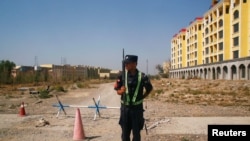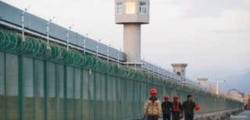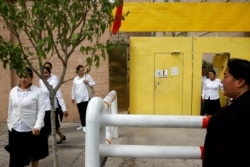As global criticism widens about the alleged forced labor of Uighurs by the Chinese government, several international companies say they are taking measures to ensure their goods from the Xinjiang region are not produced by coercive employment of the minority.
New reports, including by the U.S. Congressional Committee on China and Australian Strategic Policy Institute, said in early March that major brands such as sportswear's Adidas, fashion firms H&M, Tommy Hilfiger, Abercrombie and Fitch, and outdoor clothing company The North Face, were implicated in the alleged forced labor.
Representatives from those companies, however, told VOA that they were working with their representatives in China to prevent sourcing from suppliers that are suspected of using forced labor.
"After the allegations were made in spring 2019, we immediately and explicitly instructed our suppliers not to source any products or yarn from the Xinjiang region," said Rich Efrus, a spokesperson for Adidas.
China's northwest region of Xinjiang is home to more than 13 million Uighurs, Kazakhs and other Turkic Muslim groups. The region produces 84% of China's cotton production, making it a key hub for China's cotton products, which supply about 22% of global needs, according to a report by Center for Strategic and International Studies (CSIS).
Hennes & Mauritz AB, a Swedish multinational clothing-retail company, told VOA that it was "deeply concerned" by reports of discrimination of ethnoreligious minorities in Xinjiang, reiterating that they are not working with any garment manufacturing factories based in the region.
"We have conducted an investigation at all the garment manufacturing factories we work with in China and can conclude that none of them are employing workers from Xinjiang through what is reported on as labor transfer programs or employment schemes," Ulrika Isaksson, the company's spokesperson, told VOA.
Molly Cuffe, the spokesperson for American outdoor recreation product company The North Face, told VOA that her company considered forced labor "modern slavery." The company, she said, was committed to upholding internationally recognized human rights throughout its global supply chains, including in Xinjiang.
Xinjiang campaign
Since 2017, Chinese authorities have been accused of arbitrarily detaining more than 1 million Uighurs at internment camps, while imposing strict surveillance on those outside. Rights organizations say those in detention are put into indoctrination programs and forced to denounce their Islamic practices. The organizations say Beijing in recent months has moved to a new phase of its campaign in the region by sending thousands of Uighurs from camps to industries where they are used as cheap labor.
The Australian Strategic Policy Institute in early March released the report, "Uyghurs for Sale," which claimed that as many as 80,000 Uighurs have been forcefully sent from their homeland in Xinjiang to work in factories across China.
Chinese officials have called the reports "simply baseless," arguing their policies in the region are aimed at countering "the three evils of terrorism, extremism and separatism." The officials say Xinjiang camps are merely "vocational training centers" set up to "reeducate" the Uighur community members and teach them "new skills."
China's Foreign Ministry spokesman Geng Shuang in a press briefing March 11 said that "there's no 'forced labor' alleged by some with ulterior motives." Urging the U.S. to "stop politicizing bilateral economic exchange," Geng said coerced labor reports were a part of a campaign to distort the country's image.
US legislation
U.S. lawmakers in early March proposed the Uyghur Forced Labor Prevention Act, a bipartisan bill that requires companies to obtain certification from the U.S. government to prove that any products imported into the U.S. and sourced from Xinjiang are not made with forced labor. The bill would also demand the U.S. president to "identify and designate" for sanctions any foreign person involved in the forced labor of the minority groups in Xinjiang.
Sophie Richardson, the China director of Human Rights Watch, told VOA that the bill was unprecedented and could put pressure on companies seen as having some sway with Chinese authorities.
"We share the concerns particularly about the inability in that environment for companies to do human rights due diligence that are required of them under the U.N. guiding principles," Richardson said.
The Better Cotton Initiative, a global cotton farming standards group, on March 11 said it was suspending its licensing activities in Xinjiang for the upcoming cotton season. The decision, it said was "based on the recognition that the operating environment prevents credible assurance and licensing from being executed."
Peter Irwin, a senior program officer of Uyghur Human Rights Project, said the U.S. move could encourage more countries to take similar actions, particularly those concerned about human rights. The international community's response to the Uighur plight has been "disturbingly mild" because of Beijing's economic influence, according to him.
"The bill is significant because it takes an approach that has the potential — if replicated more broadly by concerned states — to serve as the foundation for levying a real cost on China's already delicate economy for continuing to flout international norms," Irwin told VOA.
Vanessa Frangville, a professor of China Studies at Université libre de Bruxelles in Brussels, Belgium, told VOA that European countries have been particularly criticized for not addressing human rights abuses against Uighurs.
"China works so hard in isolating states and forcing concessions during bilateral meetings," said Frangville, adding that the current coronavirus pandemic makes European countries more dependent on economic relations with China.
"As China has heavily invested in several European countries — and might soon present itself as the new savior in the economic crisis that will follow the lockdown in most EU countries — I don't really see opportunities for the EU to stand as one against China," she said.






